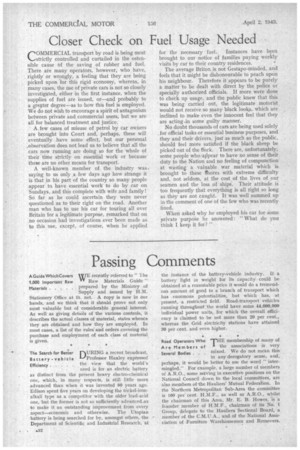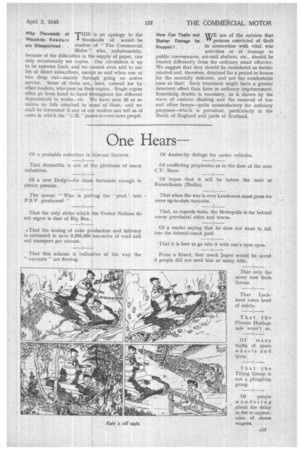Passing Comments
Page 14

Page 15

If you've noticed an error in this article please click here to report it so we can fix it.
A Guide Which Covers WE recently referred to —1 he 1,000 Important Raw " Raw Materials Guide "
Materials prepared by the Ministry of Supply and issued by H.M. Stationery Office at n. net. A copy is now in our hands, and we think that it should prove not only most valuable but of considerable general interest. As well as giving details of the various controls, it describes the actual classes of material, states whence they are obtained and how they are employed. In most cases, a list of the rules and orders covering the purchase and employment of each class of material is given.
DURING a recent broadcast, J---f Professor Huxley expressed the view that the world's need is for an electric battery as distinct from the present heavy electro-chemical one, which, in many respects, is still little more advanced than when it was invented 80 years ago. Edison spent five years on developing the nickel-ironalkali type as a competitor • with the older lead-acid one, but the former is not so sufficiently advanced_as to make it an outstanding improvement from every aspect—economic and otherwise. The Utopian battery is .being searched for by, amongst others, the Department of Scientific and Industrial Research, at
The Search for Bejer Battery -vehicle Efficiency
the instance of the battery-vehicle industry. If. a battery light in weight for its capacity could be obtained at a reasonable price it would do a tremendous amount of good to a branch of transport which has enormous potentialities, but which has, at present, a restricted field. Road-transportvehicles running throughout _the world have some 44,000,000 individual power units, for which the overall efficiency is claimed to be not more than 20 per cent., whereas the Grid electricity stations have attained 30 per cent, and even higher.
Road Operators Who THE membership of many of Are Mem bets of 1 the associations is very
Several Bodies . mixed. Wedo not mean this
in any derogatory sense, and, perhaps, it would be better to use the word " intermingled." For example, a large number of Members of A.R.0„ some serving in executive positions on the National Council down to the local committees, are also members of the Hauliers' Mutual Federation. In the Northern Metropolitan Sub-Area the committee is 100 per cent. H.M.F., as well as A.R.O., whilst the chairman of this Area, Mr. E. B. Howes, is U. founder member of H.M.F., chairman of its No. I Group, delegate to the Hauliers Sectional Board, a member of the C.M.U.A., and of the National Association of Furniture Warehousemen and Removers. THIS is an apology to the
Why Thousands of Would-be Readers are Disappointed . .
thou nds of would be readers of "The Commercial Motor" who, unfortunately, because of the difficulties in t e supply of paper, can only occasionally see copies. Our circulation is up to its extreme limit, and we c nnot even add to our list of direct subscribers, exce t as and when one or two drop out—mainly thro gh going on active service. Some of these are, later, catered for by other readers, who pass on the copies. Single copies often go from hand to hand t roughout the different departments in works, etc. We have seen 20 or so names on lists attached to some of these, and we shall be interested if any of our readers an tell us of cases in which the " CM." pa es to even more people. How Can Thefts and WE are of the opinion that Shelter Damage be , VY persons convicted of theft Stopped ? in connection with vital war
activities or of damage to public conveyances, air-raid shelters, etc., should be treated differently from the ordinary small offender. We suggest that they should be considered as feebleminded and, therefore, detained for a period in homes for the mentally deficient, and not too comfortable ones at that! Such treatment might have a greater deterrent effect than fines or ordinary imprisonment. Something drastic is necessary, as is shown by the wave of cushion slashing and the removal of bus and other lamps—quite unsatisfactory for ordinary purposes—which is prevalent, particularly in the North of England and parts of Scotland.




















































